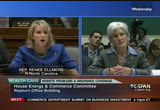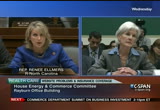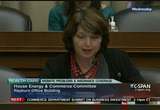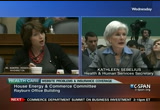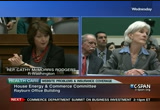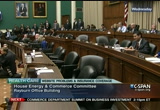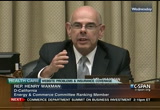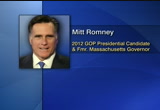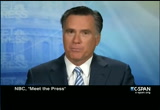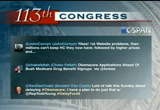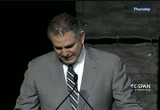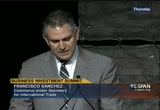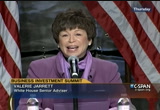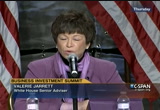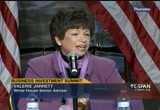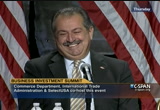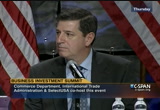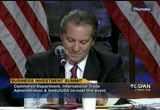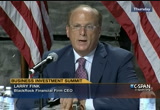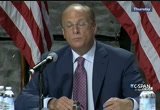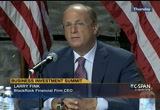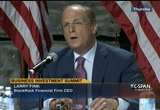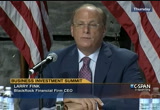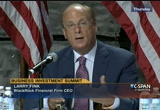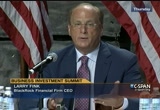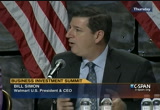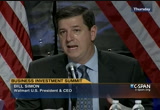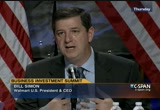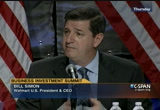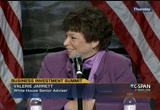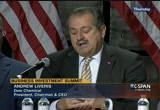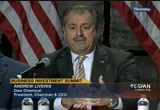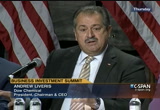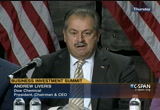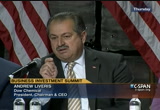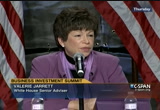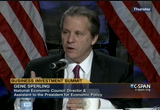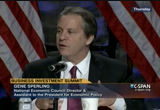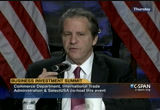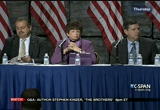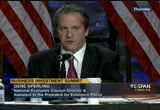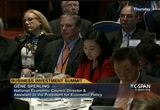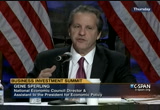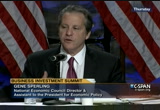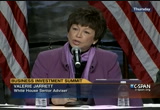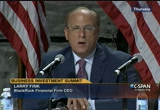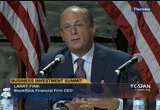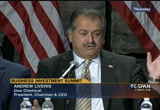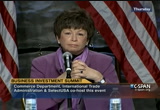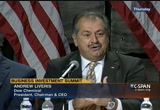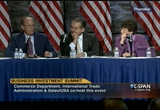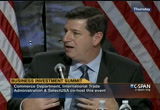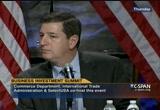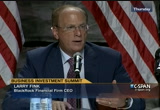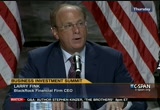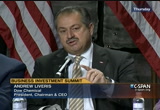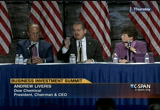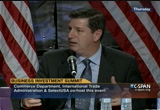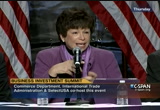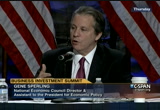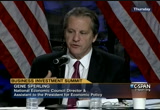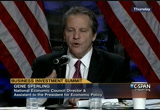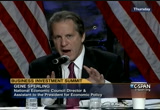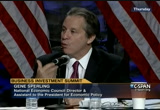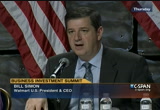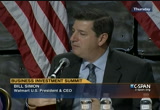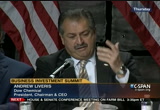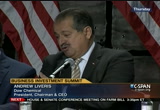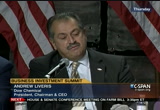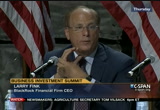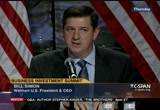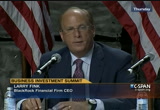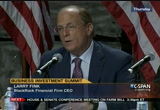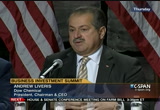tv Business Investment in the U.S. CSPAN November 3, 2013 2:05pm-3:21pm EST
2:05 pm
issue, is it not, that if an american does not have health care coverage, they are essentially breaking the law? is that not correct? >> if someone can afford coverage and has that option and chooses not to buy coverage, they will pay a fee on their -- >> and it is a law so there are they are -- >> you also brought up the issue quh you were in kansas that you fought against discriminatory issues. as far as the essential health benefits, correct me if i'm wrong, do men not have to buy maternim maternity coverage? >> policies will cover maternity coverage for young and healthy. >> including men. >> under 30-year-olds will have a choice also of a catastrophic plan which has no maternity coverage? >> catastrophic. but the men are required to purchase -- >> an insurance policy has a series of benefits, whether you use them or not.
2:06 pm
one of the benefits -- >> that's why the health care premiums are increasing, we're forcing them to buy things they will never need. thank you, madam chairman. >> the individual policies cover families, men offer ten do need maternity coverage for their spouses and for their families, yes. >> single male age 32 does not need maternity coverage to the best of your knowledge has a man ever delivered a baby? >> gentlelady's time -- >> i don't think so. >> -- has expired. gentlelady, cathy morris rogers. >> thank you, mr. chairman. although we were told repeatedly that if you liked your health insurance plan you would be able to keep it, we're now being told by the government that they have determined many existing plans to be lousy, subpar. in reality, this law is becoming quickly less about helping
2:07 pm
americans purchase affordable coverage and more about compelling millions of americans into a struggling medicaid program. in my home state of washington, 90% of enroll ees will be in medicaid. 16,000 of them coming into a program they were already eligible for. colorado, 89%, kentucky, two thirds, maryland, 97%. this is -- these are states already struggling with budgets, wondering how they are going to cover medicaid, which is as we all know for the most vulnerable population. isn't it true, that in states like washington, they are going to have new unexpected costs associated with a dramatic influx into medicaid? >> congresswoman, the medicaid expansion provision of the affordable care act is -- >> are states going to face new costs? >> federal government pays 100% of the cost of newly insured for
2:08 pm
the first three years -- >> these are existing -- people already eligible and we know that two out of three doctors don't accept new medicaid patients and we know current provider rates are going to drop at the end of 2014. isn't it true existing medicaid enroll lees will further compete for scarce resources in these states? >> if the citizens of washington who are signing up are eligible for medicaid, they certainly will be enroll in medicaid now -- >> i'm concerned that the most vulnerable in this country are going to lack access to the care they think they are going to receive. >> i think that's absolutely true. in states choosing not to expand medicaid, it's particularly dire -- >> it's existing medicaid. >> finally, i wanted to inform the secretary, you told us several hours ago when the hearing started that the website was down. if you look at the screen,
2:09 pm
several hours later, healthcare.gov is still down. you promised the system would be ready on october 1st. you're clearly wrong. so before i leave you today, i would impress upon you this is more than a broken website. this is a broken law, millions of americans are getting notices their plans are being canceled. >> gentlelady's time is expired. i just -- i would do a couple of things here. first, i'm going to ask unanimous consent that the written opening statements for any member on the committee be interest dugsed into the record and without objection, the documents will be there. consent to put the document binder and other documents presented to the secretary during questioning into the record without objection. so ordered. let me say in conclusion, we do look forward to having you back
2:10 pm
in december to get an update on where we are. we'll work with your schedule to find a right time and date early that week. i want you to know we're going to want real numbers. you'll have them by then, is that right, in terms of signup? >> we'll have them by mid november. >> we look forward to getting those done. we appreciate -- we really do appreciate your time this morning to take questions and i apologize to all of members who we had to shorten the time but those things happen when you have this much interest. we look forward to continuing to get an update and look for your continued work. >> mr. chairman, from our side of the aisle, we want to work with you. and i hope on the other side of the aisle, they would take the same approach. let's do something constructive, not just negative attacks against the bill that i think
2:11 pm
2:12 pm
p.m. yesterday to 9 a.m. today. enhancements were being made to the site online application and enrollment tools. one of the people responsible for the website is maryland abner, the administrator for the centers for medicaid and medicaid services. she's going to be back up on capitol hill testifying before the senate health education labor and pensions committee this week. appeared before the house ways and means committee last week and her hearing before the andte will be this tuesday we will have coverage here on c- span. 's just saw kathleen sibelius testimony. she will be making another appearance on capitol hill, testifying before the senate finance committee on wednesday at 10:00 eastern, also on c- span. presidentialan candidate mitt romney talked about health care law and its implementation under the obama administration on "meet the press." he talked about how the federal
2:13 pm
law differs from the one he enacted in massachusetts when he was governor and the potential impact he thinks the problems could have on the rest of president obama's term. state should be able through the laboratory of democracy model to put in place the plan that works best for them and if they adopt the massachusetts plan, terrific. if they adopt a different plan, that's fine. recognize that massachusetts teaches some important lessons some states are not going to follow. one lesson is health insurance is more expensive in massachusetts than anywhere else in the country. montana is notng necessarily going to want to adopt. you will see as a result of obamacare premiums going up dramatically across the country and going back to the key thing the president is trying to get away from is he told people they could keep their insurance and that was not the truth. whether you like the model of obamacare or not, the fact the
2:14 pm
president sold on a basis that was not true has undermined the second term. i think it is rotting it away and the only way he can rebuild credibility is to work with republicans and democrats to rebuild a foundation. we have to have a president that can lead at right now, he's not able to do so. >> members of congress are tweeting about the health care law. senate minority whip john cornyn says yikes -- first website problems than millions cannot keep health care they cannot have followed by higher prices. saysocratic congressman obamacare applications ahead of bush the care drug benefit sign- ups. article from forbes. indiana senator dan coats says lots of talk about the lake obamacare. i have a plan to do just that with congress meant todd young. get visit his website to check that out. you can read more for members from congress.
2:15 pm
we have a member's -- we have a link to the tweet list on the c- span twitter page. >> in january 1963, congress did something they had not done before. they stayed and they fought. as a result, five american helicopters were shot down. kennedy seizes on the front page of the times that says what's going on here? i thought we were winning this war. over the course of the next several months, beginning in december and through january and february, he is going to hear varying reports from white house officials, state department officials and military officials, giving contradictory evidence about the state of the military campaign in south vietnam. theovember 22 marks john f. kennedy's assassination. as part of american history tv
2:16 pm
this weekend on c-span3. departmenterce recently hosted a two-day summit in washington dc focused on business investment. next, one of the discussions from the event that included the director of the national economic council, gene sperling, and the ceos of walmart at dow chemical. this is a little over one hour. [applause] >> good morning, everyone. secretary lew, secretary pritzker, thank you so much for your very excellent remarks. and i want to thank both of them for their leadership. they have been outstanding, particularly for the subject matter that we have before us these next two days. i know that their insights, particularly as it applies to the business community, are very valuable to all of us that are joining us today. we're off to a great start to what promises to be a great
2:17 pm
conference with a packed agenda. thanks to all of you who have come great distances to be with us today. i am very pleased to announce our first panel, which is entitled why select the usa?: perspectives on investing and operating in the united states. this is going to be a very informative and valuable discussion and it is also my pleasure to introduce the moderator of this panel, an important member of president obama's white house team, valerie jarrett is a senior advisor to the president and a long-time confidant of the president. she oversees the office of public engagement and intergovernmental affairs and chairs the white house council on women and girls. prior to joining the obama administration, she was the chief executive officer of the habitat company.
2:18 pm
valerie has held positions in both the public and private sectors and hails from chicago before coming to washington, d.c. ladies and gentlemen, please give a warm welcome to valerie jarrett. [applause] >> well, good morning, everybody. you look fantastic out there. we are also delighted to be here. i would like to begin by congratulating secretary pritzker who has hit the ground running since her appointment. she has not only traveled around the world, but she gave a party and everyone showed up. i also want to give credit to former secretary gary locke who was the brainchild for this a
2:19 pm
few years ago. please stand up so we can welcome you. [applause] you will be hearing from president obama later today, but that me say a few words about why this summit and why select usa are so important. for the president, encouraging investment in the united states is a core part of his strategy to build and grow our economy. the u.s. remains the largest economy in the world, and is the largest recipient of direct investment from foreign countries, as the secretary mentioned. the competition from your partnership is fierce. it is global. the united states can no longer rely on being the biggest economy or the obvious choice. we have to work every day to do our very best. select usa is the result of it the president's broad commitment to make it easier to do
2:20 pm
business. we are centralizing resources to give information and assistance you need to navigate the u.s. marketplaces. that is why it is so important we are joined i representatives of state and local governments because they are partners in this effort. he should leave today with resources and relationships that you need to make select usa work for you and for your businesses. put simply, we want your partnership, and we are going to work hard to earn your trust and your confidence so you do select usa. i am thrilled to be joined on the stage by a great panel of business leaders who can offer there's perspectives on why the united states is such a dynamic destination for your capital. first, let me introduce larry fink, the chairman and ceo of blackrock. he has been a great partner to the administration. we have benefited greatly from
2:21 pm
his global advice about the economy. he is the largest asset manager in the world, and his counsel and advice have been important over the last five years to the president and his economic team. larry convened a group of very large global investors several months ago, and that was the fruits in the beginning of our decision to have this large conference today, so, larry, thank you for your leadership and for being here. we enjoying -- please join me in welcoming larry. [applause] next i would like to introduce andrew liveris the chairman and ceo of dow chemical. we see him almost every week. he is the kind of ceo who rolls up his sleeves and is not shy about his advice. he serves on a president's council and was appointed co- chair of the advanced
2:22 pm
manufacturing partnership. someone whose advice and counsel we appreciate. please join me in welcoming andrew liveris. [applause] we are joined by bill simon, the president and ceo of walmart usa. we work closely with bill and walmart on a range of issues important to the president and our comedy. this summer bill confided secretary pritzker to florida where he had a conference of many of his major suppliers encouraging them to invest in the united states, and he has been a partner with the administration on a range of issues, including the first lady's let's move initiative, and also taking an important position to encourage veterans to look the walmart as an opportunity for a job after they leave the military, and has set a standard that is very hard and high for everybody to match around the country, because after serving our country, the
2:23 pm
least we owe our veterans is a job when they return home. these welcome bill with us as well. [applause] last i would like to introduce my buddy, gene sperling, and the secretary gave him credit he so wells deserves for helping put together this forum, but he is the longest-serving director of the national economic council in relation cost history, -- in our nation's history. he is the brain behind all the president's major economic initiatives and has put in place and he is a force to be reckoned with within white house. he is known for coming in early and staying late and burning the midnight oil that has given his heart and soul to our country over many years. these join me in welcoming gene. [applause] let's kick things off, and i
2:24 pm
would like to ask an opening question about why businesses or investors should be bullish on opportunities in the united states. can you give us your sense of raw specs for the u.s. economy and why the united states is a good place for investment, given global opportunities, larry? >> i can answer that in two parts. one is at an investor who helped companies come to markets in bond markets and as an investor in companies worldwide. first and foremost, we have the most resilient capital markets in the world. we have the safest capital markets in the world. and years ago we credit sarbanes-oxley, and 10 years later we have now witnessed more ipo's than ever before.
2:25 pm
we are seeing young companies coming here, but not just young companies. we are seeing more international companies seeking to come here. the primary reason as an investor, we have more confidence in the financial statements of these companies, especially young companies, that we do not have a long history understanding and they do not have a long history of having strong and robust financial statements. but you feel much more confident that a regulatory process, which sometimes is so maligned in this country and it is absolutely wrong, companies are now seeking to come to the united states to find sources of capital, because the investors worldwide are willing to invest in the u.s. markets much more than these other exchanges worldwide. that is a first and a really unspoken issue related to the united states today, and today we have a couple large companies that are talking to the new york
2:26 pm
stock exchange for a listing that would be a real statement about the difficulties of investing overseas versus bringing their companies here and listing here in the united states. let me turn to, as an investor in these companies, and most of the out there, because we are the largest owner of equities worldwide. let me talk about the united states specifically which makes us so instructive on the country today. first and foremost, we were the quickest to resolve our ranking crisis. europe is going to the third round of stressing their banks. we did that for years ago. as a result of that, our banking system is asterisk ever. the weakness of our banking system, there is not enough money for loans, and you cannot save that for other parts of the country, and linking that the
2:27 pm
capital markets, we have the most robust banking and loan market. second is the drag on our economy from housing, despite there are still great pains related to housing, but we went from housing markets that had over 5 million excess homes to an economy where we will be building 700,000 homes today. that will add jobs, opportunity, and will be a source of commerce for all companies that are trying to sell components to housing. let me add one more component. as housing and construction bills, small business does because a major component of small business is in the form of construction. the third reason why i am instructive is our industry sector. i am surprised that only a few years ago people did not realize the change of technology and what that has done in terms of extraction of carbon and
2:28 pm
refining of carbon. i am sure andrew will talk about this in a minute. we have gone from a country that has on very dependent from importation of carbons to a country that exports carbon. this will be a major change, and as we see mexico changing and the verbalizing their energy law, it will only empower texas and other components of this country, and i believe having a stronger mexico only makes the united states in even stronger. this will become another major component. let me talk about a few things that people just do not talk about enough, and that is our energy cost. at blackrock, we have two major data centers. one in washington, on the columbia river, and one that we are building right now in buffalo, new york.
2:29 pm
we are paying approximately 3 1/2 cents per kilowatt. if i had to do these data centers in europe, i would be paying $.18 per kilowatt. in other parts of europe, it is over $.80 per kilowatt. we have cheaper energy, have cheaper cost of energy for manufacturing, and then the last thing, why i am very constructive on the united states and where we spend a great deal of time is our educational system, which unfortunately a lot of people malign that today. this will be discussed later, but we actually have more students overseas than any other country in our educational system. what you come here? it is not just the quality of education, but the type of education. some of the disadvantages of education globally, so many people are taught rote or talk
2:30 pm
fax. this may work very well or testing scores, and i'm not trying to diminish that at all. but i do believe that the advantage of the american style of learning, which should get more credit, is the ability to be thoughtful and critical thinking. as an employer who hired 1100 employees this year, i will tell you over 80% of our employees come from u.s. universities. we will continue to have that position. as an employer who has offices in 38 countries, the bulk of our employees come from the united states universities, and what we are looking for, people who know how to think and think creatively. >> thank you, larry. let's shift the bill. as our nation's largest retail, you have sourced from all over the world.
2:31 pm
you made a decision to increase your sourcing in the united states. could you give us a perspective on why that decision was made? >> thank you. let me thank you and the secretary and the president for their interest in energy around this initiative, because it truly is an incredible time in the history of the country and in this particular area. it is a math equation. the math equation is never in a generation or maybe longer been more favorable for investment in the u.s. we just heard about energy costs. that is one component. and the labor and transportation components that earlier in decades led to the migration of some manufacturing outside the unit as are all in our favor. if you think about it, the math
2:32 pm
equation favors expansion of manufacturing, and so earlier this year we made an announcement that we were going to increase our u.s. purchases i $50 billion in 10 years. that is $50 billion in 10 years, it is not $5 billion year, it is projected to be about $250 billion in additional spending over the next 10 years. it is a major commitment and it is done because of math and economics for us. as you mentioned, we hosted a bit of a summit similar to this of all the suppliers that we deal with and the state and local governments that we heal with, brought everybody together in orlando and kick this off. we had 1500 people in 34 states and eight governors join us, and the exciting thing was we had an outcome that launched hundreds of projects. we have been able to announce initiatives that will add 1600 jobs to begin to get this ball rolling. after the event today we are going to make an announcement with three more great companies invested in u.s. manufacturing
2:33 pm
today. we hope you all keep an eye out for that. it is an exciting time and the opportunities for the u.s., and one of the points i want to make and everybody should take note of it is there is a significant and distinct first mover advantage. if you are a state or local development officer, there's a distinct first mover advantage because as you begin to build capability and get investment, you will get component parts from it, and we have seen manufacturing in investment grew that way. be first. if you are an investor looking for an opportunity to invest money, there is a distinct first mover advantage in markets as we go forward. for our part, as the largest retailer in the world, and in the u.s., we believe and see the interconnectivity of the global economies, at a healthy and vibrant u.s. economy is very important to the global economy. investment in the building of the american middle class and the many sectors will make us a
2:34 pm
more robust economy so we can trade better with our partners. just the laws of efficiency would suggest with transportation costs increasing, the availability of inexpensive fuel and energy in the u.s., capital markets, free and stable and lowest interest rates in a particular member which just now is and it is immediate. as we think about where we are going and how we are going, we are very pleased to be able to participate. from our part, certainty is important, important how we deal with each other, how we deal with business. what we can provide is the certainty of a purchase order or contracts, so as companies look to establish and build manufacturing bases in u.s., we are changing our policies and making more longer-term
2:35 pm
commitments so they can't have the certainty to invest capital here. if we can output any decisions, we have a team that we have put in place and they are ready to serve and ready to do business. we appreciate being here and look forward to the rest of the panel. thank you. >> thank you, bill. andrew, speaking of manufacturing, you have worked closely the administration over the last five years. you have advised us on a range of issues that would make the united states more conducive to investment and manufacturing, one example being corporate tax reform so we reduce the rate for manufacturing and how that helps spur additional investment. give us the sense of being a global player in the coming from australia, give us a sense of what you think is a special about the united states. >> thank you, valerie, enter the panel here, and congratulations on making the decision to be part of team usa and the
2:36 pm
conversation we are having here. one thing that valerie did not mention is as an australian, global citizen, that has been with the great dow chemical company for 37 years, 22 of which i spent in asia, around china, when i came back to the united states over a decade ago, i was struck at the conversation going on in america that did not include manufacturing. how red manufacturing in america, and the psychology of consumers and our media and everywhere was assembly-line, smokestack, and it was yesterday's manufacturing. we had done it to ourselves. the notion that label costs would drive the manufacturing there had become what everybody leave it. so i think you did not mention this, but i read a book in my spare time as i travel to grow, looking as i traveled the globe, and they've recognized two important parts of the
2:37 pm
manufacturing value chain that the administration has embraced and which i applaud. i'm sure gene will touch on markets, that where production follows, innovation goes. the ecosystem we celebrate in this great country run universities and institutions and government r&d and how that is a precursor, the famous l labs and love labs that preceded them, 70% in the r&d is spent in the manufacturing sector for the reason. you understand the stakes, you attach researched it, and the next iteration product occurs from that. that ecosystem was not in the national conversation until the last several years. by putting it into the conversation, we can reverse the trend, that we can actually keep an ovation here.
2:38 pm
this day fact from a china perspective, i would go around the world, in 1990, china had four arab-owned -- so they have gotten it, and it is not just in china come it is germany, singapore, thailand, that compete as companies, these countries. for the united states to have this notion that it should be competing for business like a company was not about the government or small government. that dumbs down the debate. instead, it sets the rules of the road that lets the united states to become a gold medal athlete. it needs that liquidity, the financial system, to be the very best. larry talked about it that. it means the nervous system and
2:39 pm
the brains to be that fast, the innovation center, and bill and others touched on that as well. the imp is to actually build innovation ecosystems around the country, not with new money, but directing money between the public and private sector in a smart way. what is the brawn? natural resources, in this newfound energy advantage in the united states and putting it to good use to allow the united states become an export machine but to really take not just liquids, but solids and athletic brains of the broad brain and liquidity -- team usa is there. as far as i'm concerned, as i travel around the world and i come back to the u.s. and i get asked where is the bright spot here, it is here. it is for hours to squander. we can definitely get it wrong, and we have got to get all must to get it right. long story short, i think to
2:40 pm
your question, advanced manufacturing of the nanotechs, sustainable manufacturing, sustainable supplies, advanced manufacturing of robotics, of the bio kind, that is all occurring at the intersections of markets and sciences. and the united states, the course -- because of his entrepreneurial system, because of what it teaches in the schools, specially universities, because of the ways kids grow up in the system, to look at opportunity, not a problem. to go at the answer, to work out the how to make the path were great, how to reduce the human footprint on the planet -- these are the things that make united states the attractive part of the work to invest in, because you can do it here. 70% of all the dow r&d in united states is done in the united states. right now the united states is unbeatable for that. second, the value added on resources, how is putting its
2:41 pm
money where its mouth is. we're putting 5 billion dollars against the national gas advantage that was talked about. we are putting thousands of jobs at work. this will create up to 2 million jobs in the next several years. a lot of that will be exporting brains and of course a little bit of iran. >> thank you, andrew. [applause] having heard from these three global business leaders, gene, i know one of your strengths is officiating the long-term growth of our country rests with private sector job growth. help the audience understand how in creating policies you think about the comments you've heard this morning and what you have heard of the course of your tenor and how you make decisions
2:42 pm
accordingly. >> ever since president obama was first running for president, he very much had a focus on what you have to do to lay the foundation for the private sector to make the united states a magnet or job creation. i think in 2011 there was a bit of a sea change in the following way. you started to see some of our major business consultants coming out with a message, which was quite a change to their clients. it was your analysis on cost that has led us in the past to recommend you considering locations, other places, those cost calculations have changed. when you look in the future over the next 10 years, which is what you should be looking for location decisions, the wage productivity factor now has turned around and will favor the united states, number one, and, two, the realization of the
2:43 pm
natural gas cost advantage. in 2011, is also a greater realization that there were hidden costs in having an overly diffuse and remote supply chain, and perhaps that was spurred by the natural disaster in japan, but all of these started leading to more reconsideration, which of what people were advising our own companies about this is also going along, as andrew said, if the president trying to make a focus that we should be looking at manufacturing, location, like we look at r&d. it is an innovation strategy. that location matters and has sick again spillover impacts. -- has stood significant spillover impacts. now there was more wind at our back, and the president would be
2:44 pm
at his job's counsel where people would disagree, and yet you hear from both labor and management ceo's, where they would say the u.s. may be the most competitive for location of jobs as it has been in three decades. for the president policy wise, you look and realize this is a moment of opportunity, to have a positive trend, you want to put wind at its back. on the manufacturing front, we have started partnerships and will soon announce the second, third, and fourth of our network and manufacturing innovation hubs. we have had to focus on higher education, all the things that are important to stability, attractiveness of jobs, and we
2:45 pm
were successful, as you saw yesterday, and having a dramatic fall in our deficit so our path is more stable than it was. but we do think that more needs to be done. i will put it into categories. one or more additional policies that we need, cooperation from our congress to implement, to help make us more competitive and more attractive to you, and, second, is how we organize ourselves and the messages we send, which we have a little more control over. on policies, some of the things the president is pushing right now, which do for all our divisions have more partisan support than you would think, is comprehensive immigration reform, which would increase the need for skilled labor that many people say is critical to their location decisions. so this is a very top priority of the president come as is making sure our training programs are more demand than,
2:46 pm
that we are working, you and community colleges, so if you want to locate here, there's someone who says if you are a little unsure whether there is a particular skill need that may not be met in a particular location, that we will work with you to make sure there is a training program that works for you. that is one area. the second area which the president has put out is to have a grand bargain on jobs where you would lower the corporate tax rate, have a lower corporate tax rate, and at the same time use some of the one-time funds to strengthen our infrastructure so that your supply chains can move more quickly. these are important components we have to do. the third one is that we have to give and we fight very hard on this a greater sense of stability. i guess you could say we want more manufacturing and less manufactured crises. we have not been at our best the last month, but i think the future looks brighter in painting a picture of stability. now, the thing that is under our control is the signals we send.
2:47 pm
we had to recognize there were places where the signal that the president wanted to send was not coming through. one or two high- profile cases by be sending a signal that we were not open for business. we want to make clear. this is not a seen a phobic nation. if you want to come here and make your fortune, played by the rules, and invest in the united states, creating jobs, we do not just tolerate it, we welcome you with open arms. a lot of motivations for this select usa conference was to in a very bold wait make that abundantly clear. secondly, how do we organize ourselves? the united states has generally organized itself in our embassies, etc., in ways that focus on commercial advocacy and export promotion. our efforts at recruiting in united states, and this goes back administration after
2:48 pm
administration of for decades has been more ad hoc. that is not good for us because we do not have an organized way of encouraging people who want investors to invest here, but not good for those who want to do it either because it can seem ad hoc. it is not clear who is going to hell. when the president comes today, what he will talk about is a major reform effort to, for the first time ever, have the united states make an economic priority the encouragement of foreign companies to have job-creating foreign direct investment in the united states. and this is not just an empty phrase. we are engaged in a very serious effort of having unprecedented coordination between congress department, the state department working together with valerie, myself and others in the white house economic team.
2:49 pm
and what this will mean is that in the 32 to start, in the 32 nations that make up over 90% of the f.d.i. right now. for the first time ever there bb a team led by one interior and they will have as one of their core missions now for the first time encouraging and facilitating foreign investment in the u.s. and they will have one channel they will go to to the headquarters of u.s.a. so you will have one stop shopping. you will have one place you can go to to look at visa issues, regulatory issues, state and local issues. and when it's help to feel talk to someone in the white house, props even the president or vice president themselves we'll have a process for doing that. that is the major announcement
2:50 pm
we're making today. 20 or 30 years from now you will still see this organization in place and people will wonder why the united states didn't make a part earlier this type of broader select u.s.a. reform. >> thank you. i think historically most of our investments here in the united states has come from europe. today we have people from africa, from south america and from asia. i guess i would ask the business leaders to respond to gene's comments and is there more we should be doing and should we change our strategy given there is opportunity for more global investment shown here today than has historically been the case. >> i have the advantage of talking to c.e.o.'s worldwide. and in every conversation i have
2:51 pm
they are asking about how can they find more opportunities here in the united states. so many manufactures are trying to replicate what andrew and dow chemical are doing. they witness the cost of energy being 75% cheaper here than in other places in the world and as a result of that they are looking to move more and more manufacturing here. because of her educational system more technology companies from korea and japan and parts of europe and china today are looking to have foot fold in the united states today. we're not an accident of a country. i think we as a country when we have a problem, we expel the problem and we always undersell ourself as a nation. but the opportunities today
2:52 pm
because of natural gas, because of the oil production here, because of our educational system and mostly also because of her capital markets, more and more companies worldwide are look to add facilities here or a research center here. and i do believe we are going to continue to see this being driven. and this is not just going to be a by coastal phenomenon. it's going to be in the heart land and in texas where we have such cheap energy. i was in india a couple of weeks ago and one of the largest manufacturers is now building a plant in idaho because of the cheap natural gas and oil. i visited one of the largest egyptian companies recently and they are building another plant here in the united states because of this. i actually believe we are underestimating the power that
2:53 pm
we have as a country and effort i travel overseas i'm asked why aren't you more bullish yourself. why is your country acting like you have a problem? from our perspective this is the biggest opportunity we see in the world. >> i would add that we're in 160 countries around the world and i get to travel. clearly i recognize what i'm doing here. i'm the c.e.o. of a global company encouraging u.s.a. investment. fy go to another country wouldn't they ask me to do the same. at the end of the day advantages rarely sell themselves. have you to channel those advantages. i've never seen the partnership between u.s. embassies as good as it is now. i would tell you when i go see
2:54 pm
all the ambassadors that we have, there is a whole new mind set around crating not just for american companies going to those countries but the other way around, the act to get the advantages that america has, the invasion, the newfound energy advantages, the governance systems and the transparency of those and the rules are the rules are the rules. there may be dysfunctional in this town which we have to over come. that is one of the reasons we get cynical views. they say you're the greatest country on earth but you can't manage yourself. but the natural advantage of the world's largest consumer market the energy advantage, they sell themselves. what do you have to go to the next step to be team u.s.a. and help this? i think this notion i had earlier that nation states
2:55 pm
compete like companies. we have to make our incentives clearer. remove the notion it's all about subsidies. everyone thinks it is a level playing field. it is not. and establishing the principles of free and fair markets for mutual access. that's an american ideal we should be pushing as hard as we can to set the standard on trade. 16% of the global g.d.p. is manufacturing but 70% of the world trade. we have to do it in businesses like mine. that encourages us to go to places where we'll be treated fairly and the emerging markets. >> so i did -- i was in south america, europe and asia in the last six weeks, a lot of travel and met governmental officials
2:56 pm
in every country and every one was asking how can we create jobs. and the one thing that is very clear when you look at the ten- year trend in the united states, as we all know the manufacturing process has been so refined that the human element of manufacturing has been reduced dramatically. obviously this presents some social issues worldwide and issues every country is facing right now. but the point is because of rule of law andrew just discussed, because of our advantages in cost of energy, and also if you look at our work force and if you look at wages worldwide there has been a compression of
2:57 pm
wages worldwide where ten years ago people spoke about places in the world where it was much cheap tore manufacturer. if you add transportation cost tapped cost of rule of law and the cost of energy, this is why more and more countries -- companies are trying to come here. this is why i'm asked in every country today how can we create jobs and they are feeling insecure about the opportunities here. >> if i could add, we buy and sell products all around the world. and we're at competitive as anybody in the u.s. but this isn't about us or somebody else. in a global interconnected world, efficiency would suggest that production occur closest to the point of con sums. as we talk about this the emergence of demand in middle class growth all across the world is going to absorb the consumption capacity that exist today. i think we're looking at a fantastic opportunity.
2:58 pm
and we're very excited about it. i think this panel is a great example of it. we have an administration that is making effective moves to support policy decisions that will encourage it. we have capital markets ripe for it. we have manufacture, one of the world's greatest manufacturers saying the manufacturing and invasion that exists today favors expansion in the u.s. and we have somebody from the consumer market saying you have ready, willing and able buyers and consumers. i don't know what more you can ask for to understand there is an opportunity to take action now. so i'm excited. >> gene mentioned immigration reform and it's interesting because we've seen an evolution of thought is coming from the business community for comprehensive immigration reform.
2:59 pm
i wonder if you can say how that factors into our global competitiveness and the global economy impact. >> i would say i was with one of the more important leaders of europe this past summer. and the leader said to me if the united states passes an immigration law, shame on the rest of the world because we're going to be envious of the united states. that's part won. shame on us we haven't passed that immigration law right now. second of all, i do believe it would be dramatic in the future growth rates of the united states. first and foremost, we have 1 million people who are living in fear. if they had a path towards citizenship, think about the new house that is would be purchased and the construction related to that. one of the difficulties we have and i'm sure everybody has
3:00 pm
difficulties in trying to get visas for some of the really smart foreigners who are graduating in our graduate schools and undergraduate schools having a hard time to be a permanent resident or citizen here and that process is going to make it more advantageous to us. it's a problem for many dops have more workers. they are going to be productive workers that will stimulate the economy and buying houses and adding to people's livelihood. and third the immigration bill third, the immigration bill is going to be a standard that will set us apart as a nation. to that standard, in my opinion, is going to drive more and more commerce coming here. >> there is no question that the
3:01 pm
accelerators to this great position we find ourselves in as a country, there is no more important than immigration. the business community understands that because it sees gaps and deltas in the workforce that we are all filling in some way. it is not perfect and it is very very difficult. 600,000 stem jobs opened in this country right now where we can't get enough qualified candidates for. we do everything we need to do to get retraining, reskilling, dow put $250 million in a grant into 10 universities in this country to rebuild chemical engineering and chemistry departments. many of these companies on this panel, many companies are doing everything they can and not just at the phd and masters level, community colleges. we mention returning vets. many of us have curricular development and community colleges to get the modern factory worker trained, the modern technically skilled person who can work with
3:02 pm
robotics and advanced sensors, nanotechnology and nano manufacturing. all of the things i said earlier, we're doing it ourselves. what we're finding is our kids are just not as enamored with stem. this is part of what a and p version two and others and myself are going to be working on which is rebranding this notion that stem is something our own workforce should be excited about. you are right, larry. everywhere i go, the issue before the world as we are not creating enough jobs. youth unemployment is a chronic issue in most countries. the jobs of tomorrow, in the case of united states economy of today, our education system needs to catch up. our immigration system meets a catch-up. we can be the standard setter though. we can be the vanguard heard if we pass immigration reform and really get the flow of human talent of this country, wherever that may come from, even
3:03 pm
australia. if we can get some men and really be part of the system, all the advantages are here. i can think of no more pressing issue for team usa than immigration reform. >> thank you. >> i would agree. if you think back in our history, every major growth period we have had in our countries history has been preceded by or led by immigrants. we are a nation of immigrants. if you believe in free enterprise, you have to believe in immigration and the taliban capability would help fuel and drive that next level of growth. as we evaluate how we go forward, moving forward without addressing that issue would leave a problem that is been in existence in the country for quite a long time. it could actually slow and dampen the opportunities that
3:04 pm
exist. i am very pleased that is one of the topics that is going to be addressed hopefully in the next few months. >> absolutely a top priority of the president. in secretary prisco's opening remarks, gene sperling has also been working on this for a long time. i would like gene to share a little bit in terms of your prospective terms of everything we have been doing to improve skills. i would mention this last friday, president obama was in new york and he went to a school that was created in partnership between the city of new york and ibm. the goal is to get young people excited and enthusiastic and passionate about math and technology, engineering, computer science, stem as we call it. figuring out ways to get young girls interested so we can capture them when they are young
3:05 pm
and keep that passion going and they will pursue fields in stem and fill those jobs that were mentioned. >> the immigration discussion is a perfect lead-in to this because the attitude that some people might have had in the past as to why we should have or why some people would resist immigration or high skilled immigrants coming here is some notion that there is a zero sum game, there is a set pot of jobs. but this whole conference we are having here is about the fact that it is not the way the world works. there is a global competition for location and the message the president has had very much on immigration is that the three people here can hire the people that you need to fill the jobs
3:06 pm
you need, that you are more likely to locate here, you are more likely to locate here. as an open arms country, the support right now that immigration reform has very much goes to the support there is for foureign direct investment. people want to see the bottom line and what is the impact for employment. i think we tried to take a multifaceted approach. one of the things that valerie has mentioned is we as a country do not do as well in getting all of our populations interested in the science and technology, engineering, math professions they want. so you have to hit that at every approach. one is starting early getting rid of the strange social
3:07 pm
pressure that seems to make girls superstars until they are in their adolescent years and then they lose interest. encouraging more young people from minority communities to choose stem skills and professions and then also, one of the things we partnered very well in the business community is we find certain young people for whom academic study does not interest them. but when they go to high school that is connected to a particular company, they finish high school come have a degree and be first in line for a particular job, it excites a certain number of young people and helps build that pool. one of the things we're trying to do is build a pool of people who are actually getting the skills that are needed to fill the jobs that you want to be filled. the second thing is, our new secretary of labor has a great expression.
3:08 pm
he goes around and says we can't have a training policy anymore which is on the theme -- train and pray. the training has to start with understanding what are the needs, what is being demanded from the private sector. if there's one thing the president will want to focus on and have his whole administration focus on is to make sure that all of our training programs start with, are they demand driven? are we talking to particular companies and understanding what the needs are in a particular region? one of the companies, obviously, siemens, who has invested a lot in the united states, in particular working with community colleges. if you are in an area where you want to come, but you want to make sure that there is enough of the skill needs their, the idea that you can partner with
3:09 pm
the united states, that we will work with the community college on the curriculum and the skill base you need. for you, that helps to fill a job. for us, that means that we are actually increasing the skill base of the country and that will benefit you, but it will also benefit them and their next jobs as well. that is something that we need to do, but we could use that partnership and this kind of demand driven training that can be tailored to the particular needs of the region can be very important. i will tell you there's nothing the president would like more than for somebody to say, i will come locate here if you will help me get -- ensure that i have 300 more of a particular skill. that will define our vision of demand driven training over the next -- over the next of his second -- over the rest of his second term. >> it is a good segue talking
3:10 pm
about the local efforts -- we are so fortunate to have so many people in state and local government here. bill, you mention the conferences you had in florida. i would like each of you to share with us if you will your thoughts about the importance of state and local governments. bill, you obviously have retail stores all over the country. you're making decisions every day about where to put the stores based on demand. i'm sure also the welcomeness of the state and local government has an impact. >> the decisions that can be made at the federal level are more policy and environmental climate decisions. the state and local decisions are really brass tacks detail driven rubber meets the road kind of offers. what has been fascinating to see is the engagement from the states and the governors particularly in the city economic development leaders.
3:11 pm
they are competitive, they are aggressive, they are advocates for their own geographies, and it is interesting to watch as we have had discussions with manufacturers and introduced them to states with the resources that they are looking for to watch the dynamic to -- between many of the governors. they are very competitive folks. so seeing that is sort of encouraging because as jean said, they will do what they need to do to take care of the requirements that you might have from workforce capability or from a natural resource capability. we see that a lot and we see some governors very personally investing their time and making decisions about that. if anybody has any questions about who those are and where those are, please feel free to give us a call. we will be happy to introduce you to anybody who has those resources that you are looking
3:12 pm
for. >> thank you, you too comb the country looking for places to invest. how important our state and local governments to your? >> they are critical. the way i think about our company, like so many great american global companies is, we are a community company first and foremost. we are still in the place where our founder founded us 117 years ago. it is a little town in the midwest, midland, michigan. we have taken the value system of the community into other parts of the country and exporting the values of one place to another is only as good as the partnership one creates at the very local level. local government, communities, we have something called community advisory panels that we have had for decades, really, are people in our vicinity who can come in and look at all of our facilities and openly tell
3:13 pm
us how to improve. it wasn't all that long ago where we were smokestack industries and how to become sustainable manufacturers of the modern era, you really have to be in touch with your local communities. of course at the state level there are some states in the country who are very pro- business and understand that they are in the business of attracting business. they are in the business of providing jobs for their communities. as penny pritzker said earlier, the pace of business, they have adjusted. part of the problem that i think bill is alluding to but what i want to touch on is that geography is long gone apart from natural resources as the topic du jour. a state boundary or a county boundary or even a country boundary, in this world of conductivity and fast decisions and this world of incredible dynamic change, financial markets, energy markets, you name the market, consumer markets, how do you actually get
3:14 pm
everyone involved in the decision-making process at the pace of business, to use a term which i actually love. i do think elected officials, making sure their partners, i'm not talking about which side of the aisle here, i'm just saying locally, state, understanding that this is a job creation world. it is not yesterday's jobs. we have to work with the union movements, work with all the local jurisdictions. we have to work with all the regulators, but do it in a way that creates the next wave of opportunities for the community. i would say to you that that is not perfect across the country. some states do better than others. we are in 40 states, so we should know. not all equally. one of the things we do is make sure our partnership with the local level is not just one of advocacy because we create jobs, but one of critique for self- improvement. >> excellent. larry, your perspective on state and local?
3:15 pm
>> we are the financier of state and local governments, the largest investor of mutual bonds. our job is making sure that each state and local community is competitive as possible so they have the highest revenue base. we are advising quite a few municipalities and states related to, how can there be a better place for employment. so our guideline is different from other panelists, but i can say from a firsthand experience, when we decided we needed another data center, it really was designed for two things. one, blackrock citizens wanted a datacenter that was more green and so we looked for areas in the country that were more reliant on energy through hydro. our first big datacenter was there. before that we had 20 different data centers. the reason why we selected buffalo, obviously working with the state government related to that in the city and also
3:16 pm
because of the expansion of hydroelectricity from that area. so as i said earlier, this is a big opportunity for us by having the center, we are having -- we are saving over $3 million per year with this one datacenter. the fact that we are moving data centers that were principally generated through carbon, having it at a renewable center was a big advantage and something our employees wanted. >> valerie, if i can add, there are some best practices of state and local governments. we see the most successful opportunities, sort of when the local entity will point a project manager. -- appoint a project manager for each opportunity. call us if you have an obstacle and we will solve the obstacle.
3:17 pm
there are some best practices that the economic development officers have not been sharing across the board. -- been sharing across the board. we see a success for those who are the most energetic and, to use the secretaries term, move at the pace of business. >> the other area that comes to mind is infrastructure. i've spoken with all of you about the importance of infrastructure, but maybe you could share little bit from your various management points about the importance of that or what more we can be doing in the united states to make sure that we are investing in our infrastructure. >> this is something near and dear to me. as i said, when i travel around the world, every leader of every country is looking for a way to find jobs. one thing that is very clear, if you look at the countries of great infrastructure, is because
3:18 pm
there's a partnership between the public and the private. it is imperative for us, if we want to bring down our unemployment rate, that we have a national policy for infrastructure building. we do believe there are billions of dollars of private capital that would like to be investing in this. one of the great problems we have as an investor is we cannot find enough good high-quality investments that are long-term in nature. most of our clients' money is for retirement. most retirement monies 20, 30, 40 years out. it is hard to find a long-term high-quality investment. one of the things i've been scurrying around the world and spending time in washington is trying to make sure that we have a policy to build some type of policy in which there is public and private partnership in doing this.
3:19 pm
we can do that going forward. i believe there would be billions of dollars of capital that would be going into the investment of this, side-by-side with state or local government or even the federal government, for instance, in ports and airports and in our grid. i could go on and on and on. if we have the money -- the money is there from the private sector. it is imperative for us in terms of creating jobs and high- quality jobs that we make this an emphasis in the future. >> andrew? >> i will take a plus, minus on this one. we have talked a lot about the u.s. economy from the context of businesses like dow, blackrock, and many like us. i think american global corporations -- supply chains, we have over 75,000 suppliers. you can imagine it is a big number. when you think about our ecosystem, most of us are at version 6.0.
3:20 pm
u.s. economy, 100 years of growth does the, forward, upwards and onwards. our infrastructure is about at 3.0. other economies, like you said, larry, are putting in versions 6.0 in infrastructure but has not got their private sectors up that much. they will enter, but not enter where we are. they are licensing our technology. they learned from the mistakes we have made. they are like nation states competing. other countries are going to catch up on the private sector side of it, especially if their infrastructure is advanced. many of us are involved in ideas here. this capital point he makes -- and he is the doyen of rs
95 Views
IN COLLECTIONS
CSPAN Television Archive
Television Archive  Television Archive News Search Service
Television Archive News Search Service 
Uploaded by TV Archive on

 Live Music Archive
Live Music Archive Librivox Free Audio
Librivox Free Audio Metropolitan Museum
Metropolitan Museum Cleveland Museum of Art
Cleveland Museum of Art Internet Arcade
Internet Arcade Console Living Room
Console Living Room Books to Borrow
Books to Borrow Open Library
Open Library TV News
TV News Understanding 9/11
Understanding 9/11